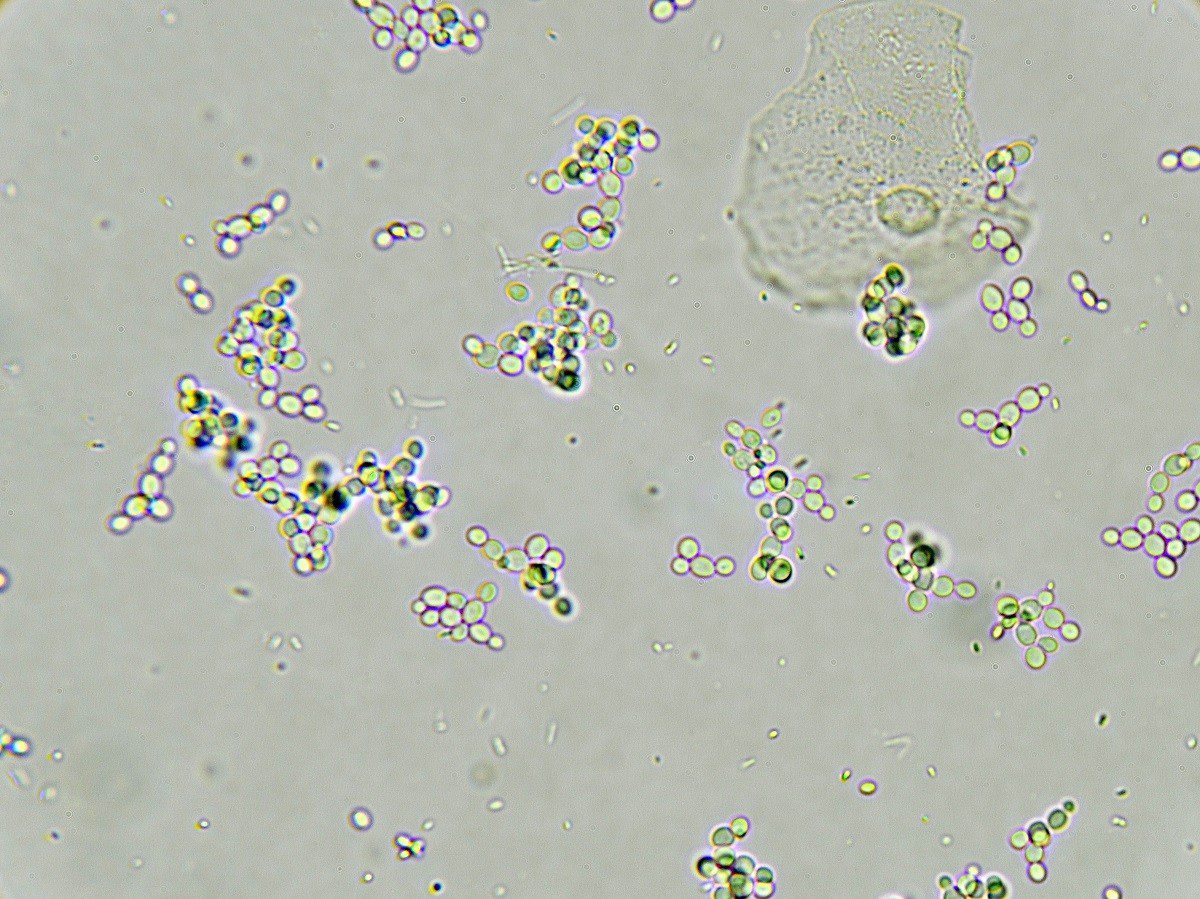Vaginal yeast infections are one of the most common health problems women can face in their lifetime. These infections usually occur when the natural balance of the vagina is disturbed. However, knowledge about the causes, symptoms and treatment methods of these infections is critical for early diagnosis and effective treatment.
Definition of vaginal yeast infection
A vaginal yeast infection is usually caused by an overgrowth of a fungus called Candida. The vagina naturally harbors this fungus, but in some cases, infection occurs when the fungus multiplies uncontrollably. This can cause symptoms such as itching, burning and white cheese-like discharge.
Prevalence of infection and who is infected

Candida fungal overgrowth
Opr. Dr. Tuba Nadide Yılmaz states that vaginal yeast infections are a health problem that approximately 75% of women experience at least once in their lives. Although these infections are more common in sexually active age groups, they can also be found in postmenopausal women. Sexually Transmitted Disease Tests with which it is possible to distinguish this infection from other sexually transmitted diseases. In addition, Gynecological Examination and Tests A vaginal examination can also provide detailed information about the presence and severity of the infection.
Vajinal mantar enfeksiyonları, kadınların yaşamlarının her döneminde karşılaşabileceği bir sorundur. Bu nedenle, bu enfeksiyonların belirtilerini tanımak ve erken teşhis için gerekli testleri yaptırmak büyük önem taşır.
Symptoms of Vaginal Yeast Infection
Vaginal yeast infections are one of the most common health problems women may face in their lives. However, recognizing the symptoms of these infections is critical for early diagnosis and effective treatment.
Physical symptoms
The most common physical symptoms of vaginal yeast infection are:
- Intense itching and burning sensation
- White, cheese-like vaginal discharge
- Redness and swelling
- Pain during sexual intercourse
- Burning sensation during urination
Emotional and psychological effects
Opr. Dr. Tuba Nadide YilmazVaginal yeast infections not only cause physical symptoms, but can also lead to emotional and psychological effects, according to
- Loss of self-esteem
- Avoidance of sexual intercourse
- Constant worry and stress
Effects on daily life
Vaginal yeast infections can also have negative effects on daily life:
- Loss of concentration at work or school
- Avoidance of social activities
- The need to constantly make appointments for gynecological examinations and tests
- The need to differentiate the infection from other sexually transmitted diseases with STD tests
A vaginal examination is a critical step in confirming these symptoms and diagnosing the infection. Early detection is key to effective treatment and being aware of these symptoms can help women lead a healthy and comfortable life.
Triggers and Risk Factors
Vaginal yeast infections are usually caused by a disturbance of the vagina's natural balance. However, knowing what causes this imbalance plays a critical role in the prevention and treatment of infection. Opr. Dr. Tuba Nadide Yılmaz emphasizes that certain triggers and risk factors can lead to this imbalance.
Antibiotic use
Antibiotics are used to treat bacterial infections. However, they can also disturb the natural bacterial balance of the vagina. This can cause Candida to multiply uncontrollably and cause an infection.
- Recommendation: When you are treated with antibiotics, ask your doctor what you can do to reduce your risk of vaginal yeast infections.
Hormonal changes
Conditions that cause hormonal changes, such as pregnancy, menopause or birth control pills, can increase the risk of vaginal yeast infections.
– Recommendation: When you experience hormonal changes, it is important to have regular vaginal examinations as part of the Gynecological Examination and Tests.
Weakening of the immune system
When the immune system is weakened, the body becomes more vulnerable to infections. This can increase the risk of vaginal yeast infections.
– Recommendation: Adopting a healthy lifestyle and eating foods that boost the immune system can reduce the risk of infection.
Excessive use of personal hygiene products
Excessive use of perfumed soaps, vaginal sprays and other personal hygiene products can disrupt the pH balance of the vagina. This can increase the risk of yeast infection.
– Recommendation: It is important to differentiate the infection from other sexually transmitted diseases and to adopt good hygiene habits.
Recognizing triggers and risk factors is the first step in preventing vaginal yeast infections. Being aware of these factors and taking preventive measures can help you lead a healthy and comfortable life.
The Harm of Wrong Treatment Methods
Vaginal yeast infections are a common health problem for women. However, choosing the wrong treatment methods can make this problem even more complicated. Opr. As Dr. Tuba Nadide Yılmaz emphasizes, treatments without the right information can cause the infection to worsen or become chronic.
Wrong treatment methods at home
Many women may resort to natural home remedies to relieve the symptoms of a vaginal yeast infection. However, these methods are often not scientifically based and can exacerbate the infection.
– Example: Applying substances such as yogurt or vinegar directly to the vagina can upset the pH balance of the vagina and make the infection worse.
Formation of drug resistance
Incorrect or incomplete treatment can cause the fungus to become resistant to medicines. This leads to the infection recurring and becoming more difficult to treat.
– Recommendation: The vaginal examination performed within the scope of Gynecological Examination and Tests plays a critical role in determining the correct treatment method.
Recurrence and chronicity of infection
The wrong treatment methods can cause the infection to recur and become a chronic problem. Chronic vaginal yeast infections can seriously affect a woman's quality of life.
– Recommendation: Diagnosing other infections with STD tests and applying the right treatment can prevent the infection from becoming chronic.
The dangers of the wrong treatment methods show once again the importance of having the right information in the fight against vaginal yeast infections. Choosing the right treatment methods ensures that the infection is treated quickly and effectively.
Scientific and Effective Vaginal Fungus Treatment Methods
Vaginal yeast infections are a common health problem that negatively affects women's quality of life. However, as Opr. Dr. Tuba Nadide Yılmaz, this problem can be treated quickly and effectively with scientific and effective treatment methods.
Prescribed antifungal drugs
Antifungal medicines are the most commonly used medicines to treat vaginal yeast infections. These medicines treat the infection by inhibiting the growth of the fungus.
– Recommendation: After a gynecological examination and tests, your doctor will prescribe the most appropriate antifungal medication.
Topical creams and rubs
Topical creams and ointments are treatment methods applied directly to the vagina to treat vaginal yeast infections. These products are usually recommended for mild to moderate infections.
– Recommendation: After a vaginal examination, your doctor will recommend the most appropriate topical treatment.
Natural treatment methods
Some natural remedies can be effective in treating vaginal yeast infections. However, it is always advisable to consult a specialist before using these methods.
– Example: Probiotic supplements can help treat yeast infections by keeping the vagina's natural flora in balance.
Lifestyle changes and preventive measures
To prevent recurrence of vaginal yeast infections, it is important to make lifestyle changes and take preventive measures.
– Recommendation: As a result of the STD tests, your doctor will advise you on the preventive measures you should take to reduce the risk of infection.
Vaginal yeast infections can be treated quickly with the right treatment methods. However, choosing scientific and effective methods in the treatment process is critical to prevent recurrence of the infection.
Post-Treatment Recommendations
After treatment of vaginal yeast infection, patients should pay attention to some recommendations to improve quality of life and prevent recurrence of the infection. Opr. As Dr. Tuba Nadide Yılmaz emphasizes, post-treatment care and proper hygiene habits are critical to maintaining the success of the treatment.
Post-treatment care
After treatment, some steps should be taken to maintain the health of the vaginal area.
– Vaginal examination: After treatment, the health status of the vagina should be checked with Gynecological Examination and Tests. This is important to assess whether the treatment was successful.
– Medication use: If medicines are prescribed by a doctor, they must be taken exactly as prescribed.
Methods to reduce the risk of recurrence
Some precautions can be taken to prevent recurrence of vaginal yeast infection.
– Hygiene: Keeping the vaginal area clean and dry can prevent the infection from recurring.
– Sexually Transmitted Disease Tests: Regular STI tests can help detect potential infections at an early stage.
Good hygiene habits
Good hygiene habits are critical to prevent recurrence of vaginal yeast infection.
– Choosing the right underwear: Choosing cotton and breathable underwear allows the vaginal area to breathe and prevents the growth of fungi.
– Correct use of personal hygiene products: Excessive and improper use of personal hygiene products can disrupt the natural pH balance of the vagina. Therefore, care should be taken when using such products.
In the post-treatment period, attention to these recommendations to prevent recurrence of vaginal yeast infection can improve patients' quality of life and help maintain a healthy vaginal flora in the long term.
Frequently Asked Questions (FAQ)
It is important to have information about vaginal yeast infections in order to deal with this condition. As Op. Dr. Tuba Nadide Yılmaz states, having the right information makes the treatment process more effective. Here are some frequently asked questions and answers:
Is vaginal yeast infection sexually transmitted?
Yes, vaginal yeast infections can be sexually transmitted. However, the risk of sexually transmitting these infections, Sexually Transmitted Disease Tests can be detected. Therefore, if you have or suspect an active infection, it is best to avoid sexual intercourse.
Is vaginal yeast treatment safe during pregnancy?
Treatment of vaginal yeast infection during pregnancy should be done under the supervision of a doctor and with recommended medications. Opr. Dr. Tuba Nadide Yılmaz states that some antifungal drugs are not safe during pregnancy. Therefore, you should discuss treatment options with your doctor.
What is the difference between vaginal yeast infection and bacterial vaginosis?
Vaginal yeast infection and bacterial vaginosis are two common conditions that women may encounter in the vaginal area. Both can cause vaginal symptoms, but the causes, symptoms and treatments are different. Here are the main differences between these two conditions:
-
Causes:
- Vaginal Fungal Infection (Vaginal Candidiasis): It is usually caused by an overgrowth of a fungus called Candida albicans. This fungus can overgrow when the natural balance of the vagina is disturbed (for example, when antibiotics are used, pregnancy, diabetes or a weakened immune system).
- Bacterial Vaginosis (BV): It occurs when the natural bacterial balance of the vagina is disturbed. It is usually characterized by a decrease in beneficial bacteria and an increase in harmful bacteria in the vagina.
-
Symptoms:
- Vaginal Fungal Infection: Symptoms may include intense itching, redness, swelling, white and thick discharge (cottage cheese-like) and pain during sexual intercourse.
- Bacterial Vaginosis There may be thin discharge, usually gray or white in color, characterized by a foul-smelling, fishy odor. There may be itching or a burning sensation, but these symptoms are not always present.
-
Treatment:
- Vaginal Fungal Infection: It is treated with antifungal creams, tablets or ointments. Oral antifungal medicines may also be prescribed.
- Bacterial Vaginosis Antibiyotiklerle tedavi edilir. Genellikle oral tabletler veya vajinal kremler şeklinde verilir.
- Prevention
- Vaginal Fungal Infection: Taking steps such as using antibiotics only when necessary, avoiding sugary foods, wearing cotton underwear and keeping the vaginal area dry can help prevent it.
- Bacterial Vaginosis Taking steps such as avoiding multiple sexual partners, not doing vaginal douching and keeping the vaginal area dry and clean can help prevent it.
Either way, if you have symptoms or concerns, contact our clinic you can contact us.














